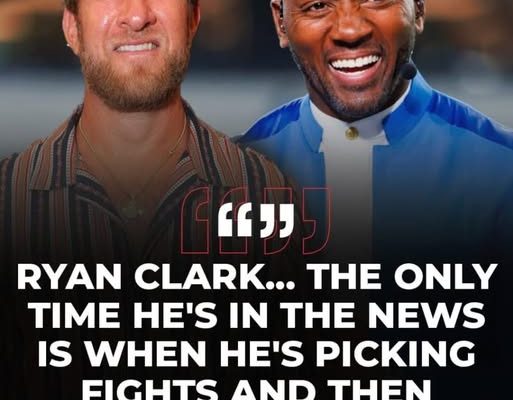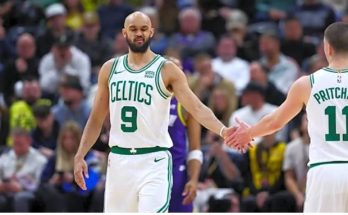Dave Portnoy has never been one to hold back when he feels strongly about someone, something, or some storyline that cuts across sports and entertainment, and his latest target has been none other than former NFL safety turned analyst Ryan Clark. The Barstool Sports founder, who has built his brand on being unfiltered, brash, and willing to say what others might only whisper, decided to sound off on Clark in a way that has stirred debate, raised eyebrows, and certainly added fuel to a fire that was already burning across the sports media landscape. Clark, who is known for his candid and at times sharp commentary on ESPN, has built a reputation as someone unafraid to call it like he sees it, particularly when it comes to player accountability, coaching decisions, and organizational mismanagement in the NFL. That quality, however, has often made him a lightning rod for criticism, especially from fans and even former players who feel he pushes boundaries too far or plays favorites depending on the situation. When Portnoy entered the conversation, it created an entirely different layer of intrigue because the two represent such different corners of the media world.
Portnoy thrives on controversy. His style is deliberately confrontational, built on challenging the mainstream and speaking to an audience that craves blunt honesty packaged with humor, sarcasm, and an unapologetic attitude. He doesn’t pretend to be a polished journalist; instead, he embraces the identity of an opinionated sports fan with a massive platform. Clark, on the other hand, comes from the traditional player-to-analyst pipeline. He’s a former Super Bowl champion who earned credibility through his career on the field, then transitioned into a role where his football insight, relationships, and understanding of the league became his bread and butter. These two men operate under different philosophies about what media should be, what sports coverage should look like, and how opinions should be framed. So when their paths collide, it is no surprise that fireworks erupt.
The specific comments from Portnoy about Clark cut deep, as he accused Clark of being disingenuous, self-righteous, and overly sensitive when it comes to criticism. Portnoy’s argument essentially boiled down to the belief that Clark uses his platform not just to analyze but to elevate himself, to control narratives, and to sometimes overstep the line between fair critique and personal attack. For Portnoy, who has built an empire on dismissing what he sees as media elitism, this represented the perfect storm to call someone out. He pointed to moments where Clark has appeared inconsistent in his takes, suggesting that the ESPN analyst tailors his opinions depending on the direction of the public tide rather than sticking to one principle. Whether you agree or disagree with that, Portnoy’s comments struck a nerve because they tapped into a larger debate about modern sports media.
Sports media has shifted in the past decade from traditional game analysis and highlight breakdowns to a more personality-driven, debate-heavy, and entertainment-focused industry. ESPN, Fox Sports, Barstool, and countless digital outlets all thrive on personalities rather than just play-by-play accuracy. Clark is very much a personality. He injects emotion, personal experience, and boldness into his takes. Portnoy is also a personality, but he comes from a place outside the system and thus often mocks or challenges those who operate within the ESPN machine. This philosophical clash makes their feud fascinating because it’s not just about two individuals but about two ways of thinking. One side argues that analysts like Clark should be authoritative voices who shape discussions with credibility and seriousness. The other side argues that fans are tired of perceived hypocrisy and want someone like Portnoy to cut through the noise and call things as they see them.
What makes this feud more entertaining is the fact that Portnoy thrives on escalating situations. He doesn’t just make a single comment and move on. He knows how to stretch a narrative, how to bait reactions, and how to dominate a news cycle. Clark, for his part, is not someone to back down from criticism. Throughout his career as a player, he was known as a fiery leader, someone who spoke up in locker rooms, on sidelines, and in interviews. That quality has translated into his TV persona. He responds, defends himself, and even throws back verbal punches when necessary. If Clark were to simply ignore Portnoy, the story might die down. But given his personality, it wouldn’t be shocking if he responds, and if he does, the cycle continues with even more intensity.
Another aspect worth noting is how fans perceive both figures. Portnoy has a loyal following that views him as the anti-establishment voice who isn’t afraid of ESPN, mainstream journalists, or former athletes who are now polished TV stars. He represents the fan at the bar, the average person who doesn’t sugarcoat and doesn’t pretend to be objective. Clark, meanwhile, has his own base of respect, particularly from those who appreciate hearing a player’s perspective. He’s articulate, thoughtful, and willing to dive into nuance, something that has earned him credibility with both viewers and players still in the league. So when Portnoy goes after him, it’s not just an individual spat but a clash of fanbases and philosophies.
The other interesting element is timing. Sports stories like this don’t happen in a vacuum. They emerge at moments when the audience is primed for debate. The NFL season is always a hotbed of storylines, from quarterback controversies to officiating to team collapses. Analysts like Clark are constantly offering opinions that ignite reactions, and figures like Portnoy swoop in at opportune times to add their spin. This makes the story less about Portnoy randomly deciding to call out Clark and more about how these debates fit into the broader media ecosystem where sports and entertainment intersect.
One has to ask, though: what is the endgame here? Is Portnoy simply looking to stir attention and keep his name in headlines? Absolutely. That’s his formula, and it has worked for two decades. But is there also a legitimate conversation to be had about whether analysts like Clark sometimes lean too heavily on theatrics, making themselves the story rather than keeping the focus on the game? That’s a question sports fans often wrestle with, and Portnoy’s comments force us to confront it once again. Do we want analysis rooted strictly in X’s and O’s, or do we prefer fiery commentary that blends entertainment and expertise?
There’s also a cultural aspect that can’t be ignored. Portnoy and Clark come from different backgrounds, not just in terms of career but in terms of worldview. This impacts how each of them communicates and how audiences interpret their words. Some fans hear Clark speak and feel empowered by his willingness to bring passion and lived experience to the conversation. Others see Portnoy as refreshing because he says what they think without worrying about political correctness or professional consequences. This cultural clash mirrors a larger dynamic in society where different voices compete for authenticity, relatability, and authority.
The reactions on social media already show how divided people are. Some applaud Portnoy for calling out what they perceive as hypocrisy in Clark’s commentary. Others criticize Portnoy, arguing that he’s picking unnecessary fights to stay relevant. Then there are those who simply enjoy the drama, treating it as part of the sports-entertainment cycle that makes following the NFL and its media circus so engaging. No matter where you stand, the fact that this discussion is happening highlights how influential both men are. Neither one can be ignored, and when they clash, it becomes impossible to look away.
The next few days or weeks could determine whether this story fades or escalates. If Clark responds directly, we might be headed toward one of those media feuds that dominate talk shows, podcasts, and social media feeds. If he stays silent, Portnoy will continue to push, and fans will continue speculating about what comes next. Either way, it’s a reminder of how sports coverage has changed. It’s no longer just about who won or lost on Sunday; it’s also about who said what on Monday, who clapped back on Tuesday, and who stirred the pot on Wednesday. Sports media is now part of the entertainment product, and figures like Portnoy and Clark are as much characters in the drama as the athletes themselves.
This situation is also an opportunity for fans to reflect on what kind of coverage they value. Do you side with Clark’s more traditional, insider-based style of analysis, or do you prefer Portnoy’s outsider, unfiltered approach? Do you think Portnoy has a point in saying Clark sometimes comes off as self-righteous, or do you believe Clark’s passion and conviction are exactly what makes him effective as an analyst? These are the kinds of debates that make sports media so fascinating in 2025.
What is undeniable is that both men command attention. Portnoy has built a multi-million-dollar empire out of being loud, brash, and unapologetic. Clark has built a respected career out of being articulate, insightful, and unafraid to confront tough topics. Together, they create a dynamic that sparks conversation far beyond the specific issue that started it. That’s the beauty—and perhaps the chaos—of modern sports media.
At the end of the day, this feud will likely continue to bubble until either both sides tire of it or something bigger steals the spotlight. But for now, fans are watching closely, sharing their takes, and choosing sides in a war of words that reflects larger trends in sports commentary. Dave Portnoy sounding off on Ryan Clark may have started as a headline-grabbing moment, but it has grown into a conversation about credibility, authenticity, and what fans truly want from the people who shape the narratives around the games they love.
Now the question becomes, where do you stand? Do you think Portnoy is right to call out Clark for being too self-righteous, or do you see Clark as simply doing his job by speaking passionately and holding people accountable? Do you think sports media benefits from this kind of clash, or is it just noise that distracts from the game itself? I’d love to hear your thoughts on this one. Drop a comment, share your perspective, and let’s keep the conversation going. After all, sports isn’t just about the players—it’s about all of us who engage, debate, and care deeply about what happens on and off the field.



